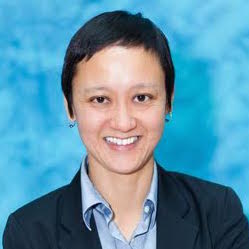AAPI Heritage Month: Miriam Yeung
 Miriam Yeung is the former executive director of the National Asian Pacific American Women’s Forum (NAPAWF), a grassroots organization dedicated to empowering Asian and Pacific American women and girls through organizing, education and advocacy. Prior to NAPAWF, Yeung spent ten years at the Lesbian, Gay, Bisexual and Transgender Community Center in New York City in numerous roles, including the Director of Public Policy and Government Relations.
Miriam Yeung is the former executive director of the National Asian Pacific American Women’s Forum (NAPAWF), a grassroots organization dedicated to empowering Asian and Pacific American women and girls through organizing, education and advocacy. Prior to NAPAWF, Yeung spent ten years at the Lesbian, Gay, Bisexual and Transgender Community Center in New York City in numerous roles, including the Director of Public Policy and Government Relations.
As a queer, lesbian woman of color from Hong Kong, Yeung has worked tirelessly to amplify the voices of a community that is often times disregarded in reproductive health, justice, civil rights amongst other pillars of intersectionality.
In an interview with the Center for American Progress in 2013 in regards to the reproductive health movement and API women’s role, Yeung states that “So specifically about how Roe has been important for the rights of API women and girls: You know in our community, like many other women of color communities, there are unfortunate stories about violations of API women’s reproductive justice. There are well-documented stories of sterilization in our communities in the Pacific Islands—for example, Japanese women during internment over and over—that others have been deciding for Asian and Asian American women their reproductive path and their reproductive freedom. So Roe is critically important in that it firmly states and gives the authority for reproductive decision making firmly in the hands, and the minds, and the hearts of the women. And I think that has absolutely been an important part of what Asian American and Pacific Islander women have needed and have asked for.”
We respect the work that Miriam Yeung and NAPAWF has been doing to represent Asian American and Pacific Islanders in the conversations of reproductive justice, immigrant rights, and other respective issues that they go through in the United States.
